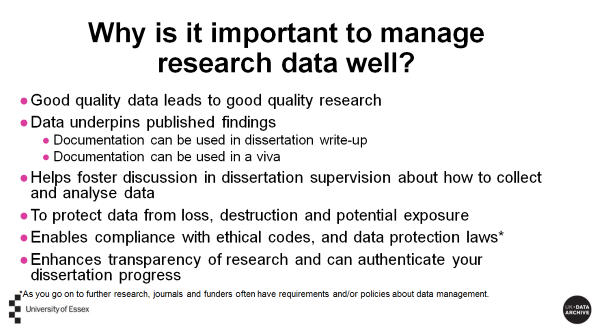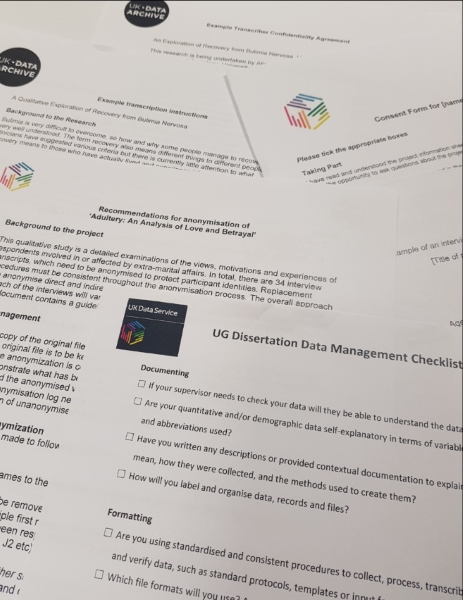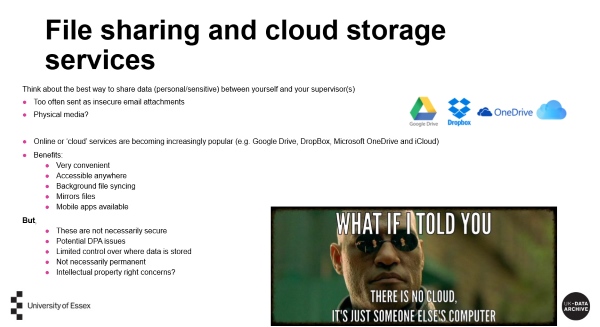Maureen Haaker and Dr. Scott Summers of the UK Data Service reflect on their recent workshop given to second year undergraduate students at the University of Essex on research transparency and data management.
The UK Data Service’s history of advocacy and training in data management and sharing
Since the early 2000s the UK Data Archive has led the way in supporting and training researchers in the social sciences on how to create high quality data for sharing.
Advocacy and guidance has paid practical attention on how to follow ethical guidelines when it comes to:
- sharing data
- how to document the research process so that resulting data collection can be understood
- how to describe a collection of data resulting from their research.
During this time, we have also seen the emergence of a growing emphasis on data sharing and open data publishing, heavily promoted by the 2007 OECD Principles and Guidelines for Access to Research Data from Public Funding, which declared data as a public good that pushed action forward.
This data sharing ideology promotes value for money through:
- more and subsequent analysis of data
- opportunities for collaboration and comparison
- richer exposure of methods
- research validation.
Indeed, the concept of replication has also become ever more prominent in the research narrative. The idea is appealing: that sharing of data that underpins research publications can help counter mistrust in research findings, eroded by problems that have occurred in peer-reviewed publications from unverifiable results and faking of data (e.g. in Netherlands and Belgium in the field of psychology).
The efforts of the UK Data Archive – and from 2013 – the UK Data Service, have been fruitful, giving rise to a number of research awards to UK Data Service staff at Essex and in creating the well-received 2014 Sage Handbook on Managing and Sharing Data: A Guide to Good Practice.
This evangelism and practical and grounded guidance around data sharing – be it quantitative or qualitative – has been oriented towards professional researchers.
A changing scene
In discussion with lecturers in various universities, we see that dishonesty is becoming more widespread, with essays and dissertations being purchased.
This has prompted new guidance for Universities on how to deal with ‘Contract Cheating’, such as in the QAA Contracting to Cheat in Higher Education: How to Address Contract Cheating, the Use of Third-Party Services and Essay Mills (QAA, October 2017).
The idea of faking data and results led Louise Corti, Service Director of Collections Development and Data Publishing at the UK Data Service, to approach various undergraduate lecturers to discuss whether deception in dissertations might be an issue, and if so, what might supervisors do to detect it.
Responding to the reply that there was not much that could be done, led her to consider a new approach. Louise observes that:
I was interested to see whether we could reduce the complexity of our current data management and sharing guidance and training, aimed at professional researchers, and apply the core principles to the classroom.
After all, this might be the first encounter with data collection that the students have, so why not start early with good practice and data housekeeping?
The QAA report focuses on both punitive and positive measures, the latter focusing on providing early guidance and practical support for students on the importance of academic integrity.
However, I was interested to see if we could introduce the idea of transparency in research into undergraduate teaching as a ‘live’ issue, and for students to appreciate that research integrity can be demonstrated through learning how to document their research and data collection well.
The undergraduate session
Maureen Haaker and Dr. Scott Summers, Senior Research Officers at the UK Data Service, took up the mantle of running the first class with undergraduates.
In January 2018, they visited an undergraduate Sociology class at the University of Essex, as part of a ‘Thinking Ahead’ module, to share advice and guidance on data management for students preparing to undertake their research dissertations.
Attendees were second-year university students who had just completed a module on research methods and were looking forward to starting their Dissertation module. The hour-long session aimed to get students thinking about some of the practicalities of their data collection, and how they could begin to demonstrate rigorous and transparent research.
Even the most experienced researchers know how messy research can get, making data management a key skill to instate from the start of any project. A dissertation is an additional strain for students – having to manage a project while also finishing their degree – making data management all the more vital.
Beyond staying on top of the data and meeting deadlines, there is also a real advantage to producing material that can help encourage constructive conversations about data collection and data analysis with supervisors.
While this session covered basic data management skills, it also stressed how a clearly documented data management plan can help to help raise the standard of their dissertation work, authenticate the work done, and likely produce a better thesis.

The presentation was divided into five areas that reflect key areas of the Economic and Social Research Council (ESRC) principles for data management:
- Assessing data
- Gaining consent
- Anonymising data
- Documenting data
- Formatting, storing and protecting data
Students were also given a booklet with: example documentation, including a model consent form, anonymisation plan and data list, examples of an interview transcript and transcriber’s instructions, and, of course, a data management checklist. All of this material was adapted to the specific needs of the undergraduate students, and included considerations such as sharing anonymised data with supervisors and storing data on university computers.

The presentation was brought to life by anecdotes of working with data at the UK Data Service.
Scott, for example, shared lessons from his own personal experience of working with data, which included admitting having to spend two days defragging a digital backup because he had not checked to ensure the backups were in good, working condition.

Similarly, Maureen also described the varying quality of interview transcripts she had worked with, and how denoting turn-taking with speakers being clearly identified can make a big difference to analysis.
Students were really engaged, and asked a lot of specific, well-articulated questions after the presentation.
Anna Sergi, lecturer for the module, said, “Thanks very much for your lecture today, much appreciated and I thought it was very clear and comprehensive.”
How can we help?
The UK Data Service is able to advise on appropriate data management across all levels of study and research and is keen to engage with staff and students and share our expertise of data management.
We are very pleased to have had two further requests from other departments at Essex to run a similar session.
We have put together a Resource Pack, entitled “Dissertations and their Data: Promoting Research Integrity” for lecturers responsible for running undergraduate dissertation support classes, which will be available in early July.
We hope by staring early that students will embrace the idea of trust in data and in the transparency of research findings, and pass on the good practice and messages as they enter their own research or professional careers.
If you think a similar workshop would benefit your students, please get in touch with the UK Data Service on datasharing@ukdataservice.ac.uk.
